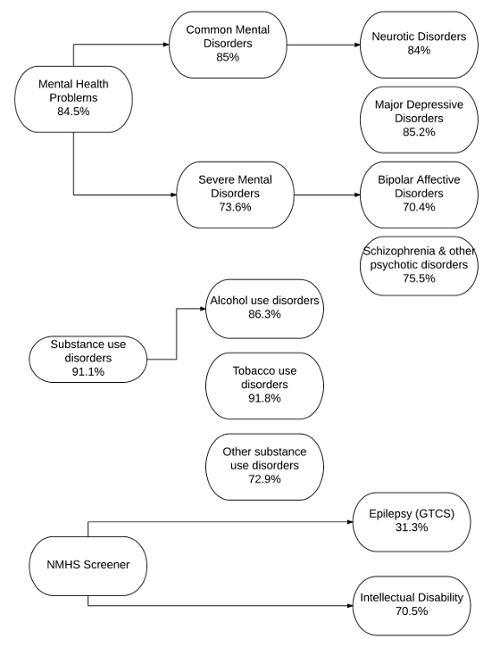83% With Mental Health Disorders In India Did Not Receive Adequate Treatment
Only about 1 in 10 with mental health disorders received evidence-based care and treatment in India, highlighting gaps in awareness and access to care for mental health issues, according to the 2015-16 mental health survey by the National Institute of Mental Health and Neuro Sciences, Bengaluru.
The treatment gap--defined as the proportion of those who have a disorder but are not treated or inadequately treated--was higher for common mental disorders (85%) such as depression and anxiety when compared to severe mental disorders (73.6%) such as schizophrenia.
Nearly 92% of those with tobacco abuse disorder did not receive any treatment, and 86.3% of those with alcohol-use disorder did not receive help, the study found.
Treatment Gap For Mental Morbidity

Source: National Institute of Mental Health and Neuro Sciences, Bengaluru
Barriers to appropriate treatment include limited awareness, socio-cultural beliefs, values and stigma. A family’s decision to seek care is also influenced by high out-of-pocket costs and the poor quality of care associated with mental health services, the report said.
For instance, studies from India have reported that primary health-care professionals are often inadequately trained, and reluctant or unable to detect, diagnose, or manage common mental disorders with many people with mental health problems experiencing stigma within the health care services, the report explained.
The survey also found that people with mental health problems usually “underwent unnecessary treatment, mainly faith healing before getting professional care”.
The report suggested creating greater public awareness around mental health issues and community engagement so that more people reach out for care. At the same time, mental health should become part of primary health care and there should be greater training and availability of mental health professionals, the report said.
There were only 0.3 psychiatrists per 100,000 population in India, with most of them in the southern and western regions of the country, lower than 1.5 per 100,000 in Turkey, 11.1 in Russia, and 4.5 in Brazil, the mental health survey of India noted.
(Shah is a writer/editor with IndiaSpend and FactChecker.)



